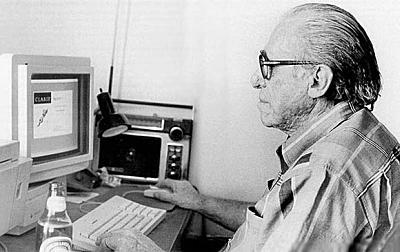
That was written by Charles Bukowski, pictured above. When people were saying in the early 90s that computers were "glorified typewriters", he was embracing the new movement...that was the impetus for me to use this photo. I'm not promoting his writing or his beliefs because I don't agree with all of them, but nevertheless it's important to discuss him.
I always wonder about authors like him, and how they would view me (and if I achieved success in my writing, how they would see me then).
I never starved, although life's been hard since I moved out by myself five years ago. I never had parents who didn't care about me - they give me money to help me live. I never absolutely had to work a deadening job in order to survive, although I've worked those jobs before. I've never had a delibitating illness or physical handicap. I've never had to go to war. I've never suffered a great loss (such as the death of someone very close to me, yet). I've never had to run for my life.
But I don't see myself as better than people who've gone through these misfortunes. And I don't try to hide myself from the misfortunes of the world. I've never wanted to live off of my parents for as long as I could, I wanted to live on my own terms and support myself...but money is addictive when I have little of it. And I never believed that I was special and the world needed to know - I've only known that I'm taking a path which few people take, and I'm using the talent I have to press through it. And does it really matter what they would think? Do I need to dwell on it? (Not really.)
Yet if they saw me as unwise and uninformed as a result of not going through what they've gone through, and as a result they didn't see me as capable of creating great literature...is that tolerable? Do I need to suffer like they've suffered? Will that allow me to write better? (No.)
A lot of soldiers want to write their life story. And they do, and they take it to a self-publishing company and have it released. They're proud of having written their story. Does the fact that they've been through the depression of war mean that their work automatically has more substance than my own (assuming their experience/position led them to experience the sickness war can hold)?
I don't think so, but some would say that it's true. And this is another part of the interior struggle I have to contend with, being on my own and having a passion for literature.
Bukowski's quote above disgusts me - I never want to become someone who writes like they mean it yet can't maintain a stable life outside of writing. Who just leeches off of everyone and doesn't sculpt their own place in the world, who can't support a family, who only thinks of himself, who doesn't believe in charity. And yet still he strives to write meaningful literature. Again the question of autonomy comes up.
The quote ties into a mantra of mine that I've been thinking of for years - "It's so easy to fail and so hard to succeed." The two thoughts, when intertwined in my mind, create a parallel between how hard it can be for people to maintain a respectable position in life.
Many people, once they learn the discipline and craft of writing, can write a poem. And I'd like to believe that the meaning of that poem is based on how respectable the poet is outside of their writing, although that isn't always the case.
The image of me standing on the street, with clothes that attempt to look upper-class but are still fraying, with nothing to my name and no family, holding only my published work...it makes me wonder how far can the romanticism of art be pushed. People set themselves up to fail all the time. The lamentations of writers regarding how little literature has given to them in contrast to how much devotion they've given to literature is frightening.
So I shouldn't think about it and I shouldn't waste time, don't talk about it, only do it. Virginia Woolf wrote two pages a day. I told a friend of mine years ago that I wrote two hours a day (but nowadays I don't) and he was surprised at my level of dedication. I don't know where that dedication is going to lead. Yet it won't let me melt into the person I never want to become.
No comments:
Post a Comment